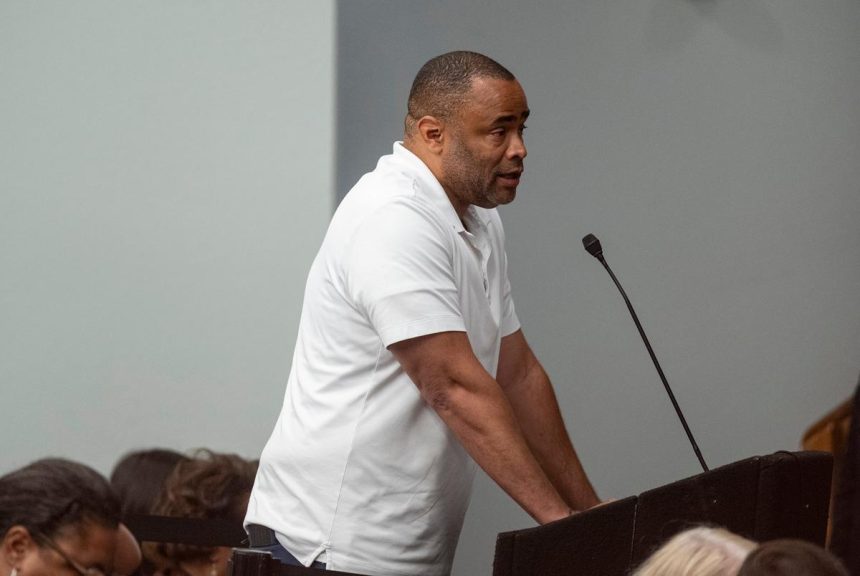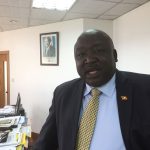For the last decade, southeast Fort Worth has been represented in Congress by U.S. Rep. Marc Veasey, a Democrat.
Veasey has championed efforts to promote economic development there, a historically Black part of town that leaders have sought to revitalize after decades of economic disinvestment. Veasey has secured millions of federal dollars to aid those revitalization efforts, including dollars to build affordable housing and reinvigorate commercial corridors that have seen better days.
Under a plan by Texas GOP lawmakers, Veasey’s seat would be obliterated from Fort Worth. Black and Hispanic voters in the heart of Veasey’s district in Fort Worth would be split between two districts that stretch away from the region’s denser urban areas into neighboring rural counties.
Ty Stimpson, a lawyer who chairs the Fort Worth Metro Black Chamber of Commerce, said he views the “growth and success of minority-owned businesses and Black businesses” as nonpartisan. But he’s skeptical that a new representative could immediately have the know-how to continue Veasey’s efforts.
“Whatever our politicians throw our small business owners’ and our Black business owners’ way, they will find a way to prevail and continue to excel and reach new heights,” Stimpson said. “But it is disheartening to see the work that so many people in the Black and Brown community have fought and advocated for be taken away.”
The proposed change in Fort Worth, the state’s newest city with more than 1 million people, is just one example of how the Republican push to redraw the state’s congressional maps isn’t just a partisan move but one that deeply affects how Texans are represented in Congress.
[How Texas’ mid-decade redistricting could affect voters in one Houston community]
At the behest of President Donald Trump, Texas Republican lawmakers have sought to redraw the state’s congressional map to gin up the number of U.S. House seats held by Republicans.
Under the proposed maps, districts that once primarily represented cities and suburbs that often swing Democratic would be broken up. These communities, made up of large populations of Black and Hispanic voters, would then be stitched to wide swaths of rural areas, effectively handing rural GOP primary voters greater control over who represents some of the state’s biggest cities in Congress.
“They’re diluting the political influence of the disfavored Texans, the Texans they don’t like,” said Andrea Barreiro, associate professor of mathematics at Southern Methodist who studies redistricting. “Those Texans tend to vote Democratic, they tend to be urban and they tend to belong to racial minorities.”
Gov. Greg Abbott called on Texas lawmakers to redraw the state’s congressional maps after the Department of Justice warned the state that four majority-minority districts in the Houston and Fort Worth areas were unconstitutionally racially gerrymandered. That warning came after Trump began pushing state legislators to redraw the voting maps and after the state’s lawyers argued in court that those maps are race blind. Critics have blasted that reasoning as nothing more than political and legal cover to justify redrawing the maps.
In redrawing the maps, Texas Republicans are effectively robbing constituents of representatives who have worked to improve their parts of the state, in some cases for more than two decades, Democrats, political observers and community groups argue. Navigating Congress and the federal government along with knowing the needs of localities, business leaders, neighborhoods and nonprofits in a district, isn’t something that can be mastered in two years. Resetting the lines means huge swaths of Texans will lose clout in Washington, D.C. — and may spur further discontentment with government.
“Regardless of whether you’re a Democrat or a Republican, if you have that disconnect, what you end up with is a lot of people who do not feel well represented in Congress,” said Jim Riddlesperger, a former political science professor at TCU.
Lines can be shifted with remarkable precision, moving single neighborhoods between congressional districts. That was the case for a McAllen neighborhood, where U.S. Rep. Vicente Gonzalez, a Democratic lawmaker, currently resides. The La Mansion neighborhood, located on the city’s northeast side, sat in Texas’ 15th Congressional District until it was drawn into the 34th Congressional District in 2021, which Gonzalez now represents. The proposed changes would move that neighborhood back into the 15th.
“It’s like you’re putting Hidalgo County under a scalpel and you’re carving out all these little neighborhoods here and there,” said Michael Mireles, director of community engagement for La Union Del Pueblo Entero, a nonprofit group that provides services and advocates for immigrants and low-income communities.
The 15th Congressional District, which runs from Hidalgo County to south of Bexar, is represented by U.S. Rep. Monica De La Cruz, an Edinburg Republican. It was a historically Democratic district until 2021 when it was redrawn to become more favorable for Republicans. The 34th Congressional District, held by Gonzalez, is attached to Cameron County and runs north to Nueces County. The new maps are intended to make the 34th a Republican-friendly district, too.
It makes a dramatic difference whether one area falls within one district or the other, Mireles said. Groups like LUPE train voters and residents to engage with lawmakers. As a progressive organization, they have to employ different tactics to engage with Democrats and Republicans. For example, the organization has to spend more energy trying to convince De La Cruz to vote against measures like the “One Big Beautiful Bill,” the GOP’s landmark tax and spending bill. The bill contained cuts to benefits like Medicaid and the Supplemental Nutrition Assistance Program which residents in these two districts heavily rely on.
Mirels said he wouldn’t have to expend that effort with Gonzalez or whichever Democrat represented the 34th district, knowing they wouldn’t vote for the bill.
“Because I know that, I can reach out to my representative about other things that would have either changed the course of the bill or even just work on other priorities,” Mireles said.
When a line on a congressional map shifts, it shakes up institutional knowledge and resets relationships between representatives and community leaders who advocate for local interests, observers said. Cities, business leaders, neighborhood associations and community groups have to rebuild relationships with a new representative to get their needs heard. Over time, representatives build up knowledge about the particular needs of their districts based on their socioeconomic makeup and the mix of industries within the district, among several other factors.
If a rural lawmaker’s district now includes urban areas, they theoretically have to learn about those places and how best to represent them, said Mark Jones, a political scientist at Rice University.
“You’re in a better shape when that representative has experience and where, for them, it’s a priority, because that’s a core part of their district,” Jones said.
The seat held by U.S. Rep. Julie Johnson, D-Farmers Branch, is completely contained within urban and suburban parts of Dallas and Collin counties. Under the proposed map, the urban-suburban portion of the district would be significantly condensed so it could contain wide swaths of rural East Texas. Johnson herself would no longer live in the district as drawn.
That presents a few problems, Johnson said in an interview. For one, urban and rural areas have different and sometimes competing needs across a whole host of issues like housing costs, transportation infrastructure, workforce needs and healthcare access that would be difficult to balance.
Now, Johnson’s district is relatively compact. It’s easier for her to make her away across the district, and for constituents to find her or her staff, she said. Under the new map, constituents on either side of the urban-rural divide would find it more difficult to access their representative, depending on who ultimately wins the seat.
“Obviously, members of Congress learn how to represent their districts in full,” Johnson said. “But it’s just much more challenging for the member, and it’s much more challenging for the constituents when the districts are spread out over hundreds of miles like this would be.”
Urban voters are particularly primed to lose out under the proposed maps. Texas’ major urban areas — Dallas-Fort Worth, Houston, Austin and San Antonio-New Braunfels — account for roughly 72% of the state’s economic output and fueled the state’s economic and population growth. But in keeping with a yearslong assault on the state’s bluer urban areas by state GOP lawmakers, those areas would see their influence diluted under the proposed maps.
The influence of the state’s urban areas in Congress is already watered down, but the proposed maps would further reduce that influence. If lawmakers only considered population when drawing congressional maps, urban areas’ representation in Congress would be much more concentrated, according to an analysis by Barreiro, the SMU professor. Dallas and Tarrant counties would have six districts contained entirely within their borders, her analysis shows. Instead, they have four and stand to lose one under the proposed maps.
The proposed map would leave Fort Worth, which surpassed 1 million residents last year, with only one congressman based in the city as it booms, Stimpson noted.
“I think it’s of greater concern to Fort Worth as a whole that we don’t have, as a city, the representatives that call Fort Worth home,” Stimpson, the chair of Fort Worth’s Black chamber, said.
Harris County, the state’s most populous urban county, should also have six seats that sit entirely within the county, her analysis shows. It has three, a number Republicans want to take down to two.
“You have to have healthy cities to have a healthy economy,” said Annise Parker, a former Houston Mayor running for Harris County judge. “But if you create districts where, in order to get reelected, the elected officials are beholden to rural and suburban voters, and they begin to neglect the needs of those urban areas, that economic engine begins to stutter and the things that those urban areas need to draw prosper don’t get funded.”
More all-star speakers confirmed for The Texas Tribune Festival, Nov. 13–15! This year’s lineup just got even more exciting with the addition of State Rep. Caroline Fairly, R-Amarillo; former United States Attorney General Eric Holder; Abby Phillip, anchor of “CNN NewsNight”; Aaron Reitz, 2026 Republican candidate for Texas Attorney General; and State Rep. James Talarico, D-Austin. Get your tickets today!
TribFest 2025 is presented by JPMorganChase.








